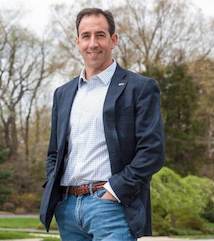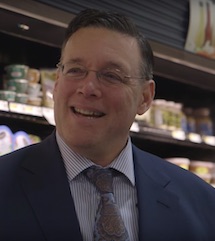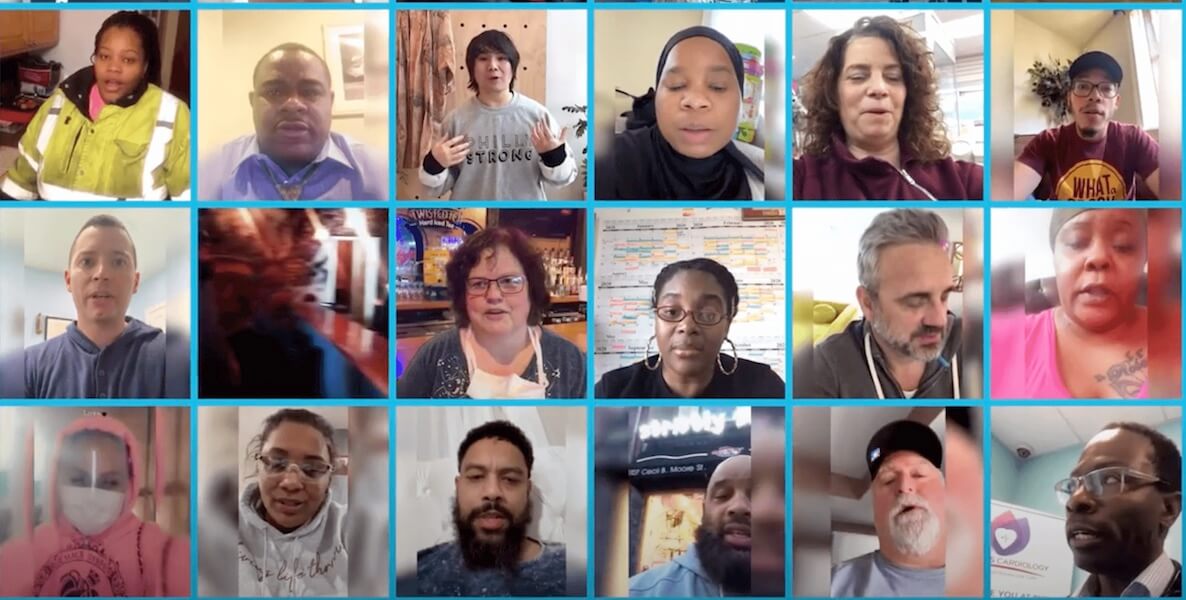to this story in CitizenCastListen
Bartos had grown up in Reading, Pennsylvania with Pete Snyder, and their lives since have seemed to run parallel tracks. Five years before Bartos’ run, it was Snyder who was a Republican candidate for Lieutenant Governor, in Virginia. Like Bartos, Snyder’s free market bona fides had long been accompanied by a social conscience.
When, for example, Snyder sold his company New Media Strategies, which The Washington Post once dubbed the “largest social media agency in the world,” to the Meredith Corporation, he set up a $2.5 million employee stock pool, saying: “This is how it usually goes: A company gets sold, the owners do well, and all the employees get screwed. I wanted to do something really different.”
Now, here was Snyder, pitching Bartos on his latest passion play. He’d started a nonprofit called the Virginia 30 Day Fund, giving out $3,000 forgivable loans to small businesses to help them get through the crisis caused by Covid, as captured in this moving CBS News story:
“You should start a fund in Pennsylvania,” Snyder told Bartos, who demurred. He’d just gotten his own company’s loan — after so much worry, it was time to just exhale.
“That’s when he went right for my heart,” Bartos recalls today.
“When you look back at this time 10 years from now, do you want to look back and say you bitched about your financial situation, or that you helped people who needed help?” Snyder asked.

Bartos was in, and within a day he surrounded himself with an all-star lineup of business and thought leaders. Joining Bartos on the Pennsylvania 30 Day Fund board would be force of nature Jeff Brown, CEO of the ShopRite chain of Brown Superstores; Richard Phillips, a former Justice Department official and U.S. Senate staffer who, as CEO, had deftly turned around Pilot Freight Services into a cutting edge logistics company before its sale to private equity; Cassandra Bailey, Slice Communications CEO; Roger Braunfeld, partner at Royer Cooper Cohen Braunfeld; Maia Comeau, public affairs consultant and CEO of Comeau and Company; Thomas Nerney, CEO of United States Liability Insurance Group; and Mustafa Rashad, CEO of the government relations and communications firm Bellevue Strategies.
Together, they quickly identified a need. They’d seen the stories about the damn-near-conglomerates and insiders who seemed not-so-shockingly first in line for Paycheck Protection Program relief, and they’d heard the tales about the small businesses who have applied for forgivable loans in a time of crisis yet still await word of their fate.

But what they hadn’t heard so much about are those mom and pop neighborhood stores that have largely been shut out of consideration for PPP funding, either because they have no prior relationship with a bank (some don’t even have checking accounts), or they lack access to a lawyer or accountant to walk them through the complicated application process, or because they themselves are returning citizens and are thus ineligible.
So, rather than just complain about a broken system or petition the government to right itself, Bartos’ group instead launched a local version of Snyder’s program, which is like a type of regional PPP — without all the bureaucracy, and with an intentional focus on helping those who have so far been left behind.
Rather than ask anyone’s permission, they just did it, and now, in a matter of weeks, they’ve gotten over 1,000 applications, raised upwards of $400,000, and distributed more than 50 forgivable loans of $3,000 apiece to storefront businesses that impact their communities and are desperate to keep their lights on.
“If we could just get society to feel the ripple effect of how connected we are, how we really are each other’s brothers and keepers, wouldn’t that make all the difference?” Brown says.
In the process, at a time when there is much talk about civic mutuality, these machers have modeled it in a concrete way that just might suggest a way forward.
After all, if you agree that our ever-burgeoning gulf between have and have-not is our most dire problem — and that the challenge has simply been laid bare and exacerbated by Covid — then a group of haves coming together to aid those who, were it not for such intervention, just might slide below the poverty line qualifies as the type of object lesson these divided times call for. We all talk about how we’re “all in this together,” but how many among us turn the cliche into a way to spend vast chunks of our quarantined lives?
How to apply LEARN MORE
When they consider applications, Bartos and his team purposefully do more than evaluate worthiness on pure P & L and credit factors, as an established bank would. “We ask ourselves, ‘Is this business important to the community?’” Brown tells me. “‘Would there be a hardship in the community if this business didn’t exist?’”
“When we started the Fund, my motivation was simply to help small businesses get through this crisis,” says Phillips. “But I’ve come to realize the Fund is a blessing for me as well as for them. Seeing so many hardworking people, who care so deeply about their employees and communities, has been eye-opening. Their perseverance inspires my own.”
Support small business ownersDo Something
In fact, their nightly Zoom meetings get pretty emotional, when they see applicant videos for the first time. (Brown says it’s Bartos who is usually the first to tear up.) “You fall in love with these people,” Bartos says. “They’re entrepreneurs, and you want to help every one of them.”
“In their spirit and ingenuity, they’re really what America is all about,” agrees Brown. See a few for yourself:
- Vegan bakery in Philly
- Restaurant in Kane, PA
- Hair Salon in West Philly
- Cardiologist in Philly
- Woman-owned contracting business
For Mom and Pop recipients, a $3,000 forgivable loan can make a big difference, yes, but what the Board members of the 30 Day Fund are finding out is that the value extends well beyond the figure on the checks they’re distributing. (How priceless must it be to get mentorship from CEOs like Phillips and Brown?) And that, for them, there’s considerable value in giving. At a time when so many are so alone and so afraid, a call that notifies of an award can be life-affirming…for recipient and giver alike.
 One recent morning, Brown called a young African-American beautician to tell her she’d be getting a $3,000 check. But when she answered and he said who he was, she jumped in:
One recent morning, Brown called a young African-American beautician to tell her she’d be getting a $3,000 check. But when she answered and he said who he was, she jumped in:
“Oh, Mr. Brown, it’s so nice of you to call and check on my Mom,” she said.
Huh? Turns out, her Mom works at one of Brown’s stores, and had left work early, feeling ill. He was happy to hear she was doing better, but had to explain that wasn’t the reason for his call. Afterwards, it all made sense.
“We’re all connected in so many ways we never think about,” Brown says. “That mom works for me, that family probably shops in my stores, that daughter probably does the hair of my customers. If we could just get society to feel the ripple effect of how connected we are, how we really are each other’s brothers and keepers, wouldn’t that make all the difference?”
While crying, Moore kept trying to apologize, and explain — he hadn’t cried like this since his Dad died. “But I’ve been praying for something good to happen,” he said, breaking down again.
Their work has been a string of epiphanies, as when Bartos called to alert Gregg Moore, the African-American, mid-50s owner of Society Hill Plumbing, that his grant had been approved. Before doing so, Bartos asked Moore to tell him about his business. I try to hire returning citizens, he said, so I can teach them a trade. Business had dried up since Covid. Suddenly, Moore interrupted himself.
“Can I ask you a question?” he said. “Am I stupid?”
Bartos did a verbal doubletake. “No, what do you mean? No,” he said.
“I’m not the smartest guy,” Moore said. “I didn’t go to Wharton, but I’m a good plumber with a good business and no debt. The last eight weeks, I feel like I let my family down, let my employees down. I didn’t see none of this coming.”
“Gregg, let me assure you,” Bartos said. “I do have fancy degrees, and I didn’t see this coming. I’ve beaten myself up, feeling like I let down my employees. Please hear me, Gregg, you did nothing wrong. We’re both small business owners, and we’re both doing our best, and we’re all going through this thing.”
“Thanks,” Moore said. “I guess I just needed to hear that.”
“Well, let me lighten your load for you, a little,” Bartos said. “We’re going to put a check in the mail to you today for $3,000.”
More about how to helpVideo
What’s in store for our worst-in-the-nation poverty rate of 25 percent? Are we looking at 35 percent? 40? If so, those will be people who are used to working, just like Gregg Moore. Most of them will be African American, most of them will be female, many of them will be young.
In the aggregate, the Pennsylvania 30 Day Fund does not currently have enough in it to ultimately do much to stem the tide poised to overwhelm them. But for those who get these calls, it’s both a lifeline and a sign that they’re not alone; for the rest of us, it’s a case study in the power of commonality, in the difference that can be made in real lives when one citizen says to one other fellow citizen: “I’ve got your back.”
The Citizen is one of 20 news organizations producing Broke in Philly, a collaborative reporting project on solutions to poverty and the city’s push towards economic justice. Follow the project on Twitter @BrokeInPhilly.




